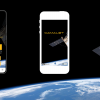
Ahead of World Meteorological Day, you can help improve weather forecasting models with CAMALIOT, an infrastructure and app that uses GPS from smartphones to support scientific research. Join our crowdsourcing campaign on 17 March 2022 ̶ any person with access to an Android cellphone is invited to download the free app and participate.
It is a well-known issue that weather forecasts are sometimes not that accurate. There is therefore still a lot of potential to explore additional data sources to improve weather prediction models. A large quantity of GPS data from smartphones and satellite navigation devices could help to improve the general understanding of weather phenomena and make these models more precise. To this end, the CAMALIOT project was launched in March 2021.
CAMALIOT: Collecting GPS data for scientific research
CAMALIOT was commissioned by the European Space Agency and is led by ETH Zurich in collaboration with IIASA. CAMALIOT (Application of Machine Learning Technology for GNSS IoT Data Fusion) aims to build an infrastructure needed for the gathering of large volumes of observations from GPS-capable receivers of various kinds and quality. This infrastructure is being developed in the group of Benedikt Soja, professor of Space Geodesy at the Department of Civil, Environmental, and Geomatic Engineering at ETH Zurich, Switzerland.
The CAMALIOT Android app allows users to access and collect raw GPS satellite data from individual cellphones, taking advantage of dual frequency and multi-constellation chipsets now available in modern Android cellphones. The app was designed by IIASA, where Linda See, a researcher in the Novel Data Ecosystems for Sustainability Research Group, oversaw the project.
How to get involved
The crowdsourcing campaign starts on 17 March 2022 and will run for four months, collecting data from as many locations as possible through a citizen science approach. Interested citizens and researchers are encouraged to download the free app and collect data (ideally while keeping the phone static and with a good view of the sky) and then to upload the data to the CAMALIOT server.
The collected data will be ingested in artificial intelligence systems for the determination of tropospheric parameters to support weather forecasts on Earth, as well as the monitoring of weather in space, which is important for satellite operations and communications.
All data will be treated anonymously and will only be stored on European servers.
“By using the CAMALIOT app to help us collect data, people will not only be helping us to improve weather forecasting and the general understanding of weather phenomena, but also to investigate new scientific opportunities that could benefit society in the future,” note Soja and See.
Learn more about CAMALIOT in the 1-minute video below and find out how you can participate on the dedicated website: www.camaliot.org
The CAMALIOT mobile app is also available from the Google Play Store.
News

06 February 2025
Rethinking energy demand can foster sustainable development and reduce emissions from buildings and transport

05 February 2025
Gender equality is crucial for a climate resilient future

16 December 2024


